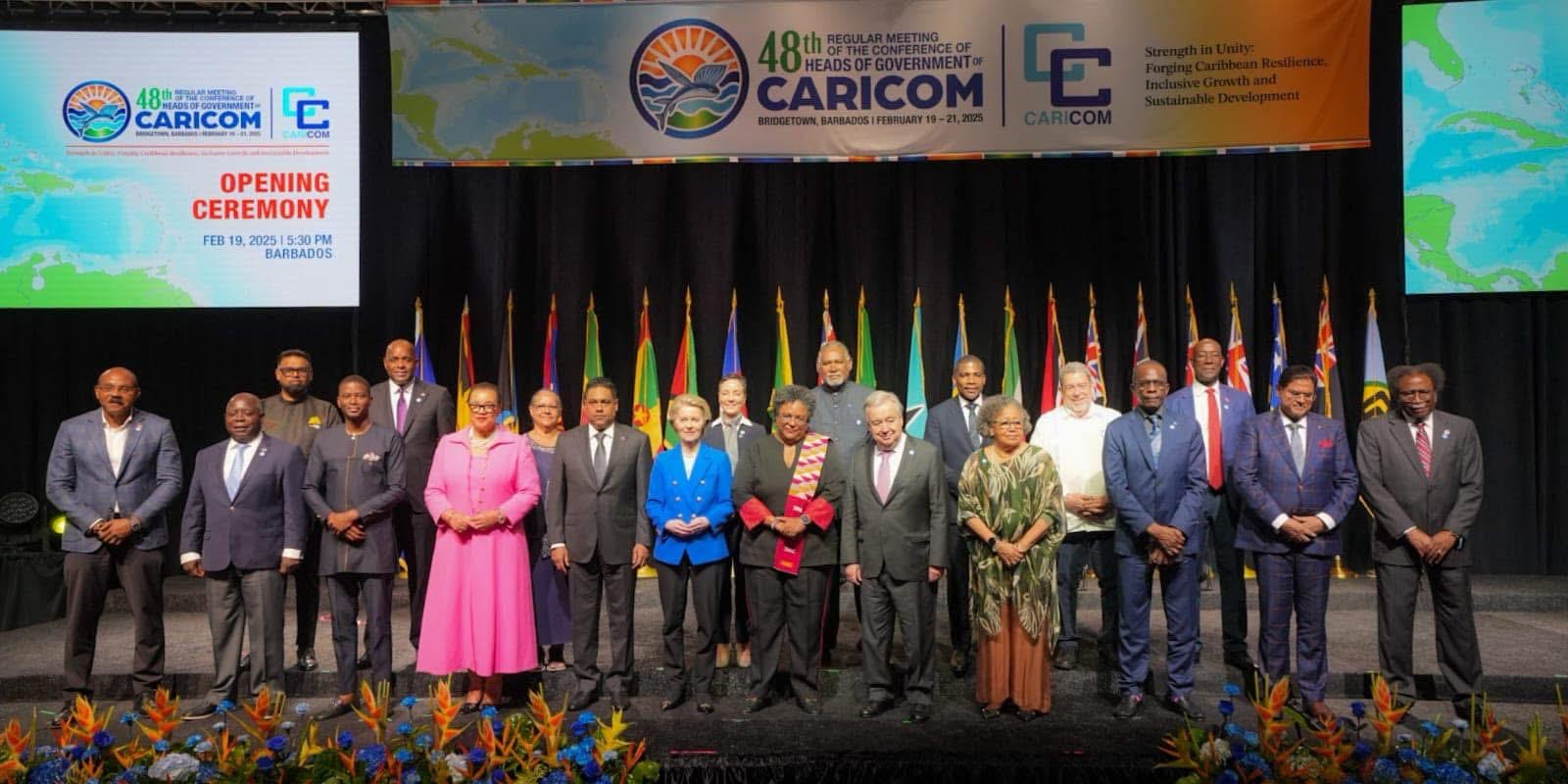CARICOM Heads of Government Commence 48th Conference with Focus on Transformative Dialogue.
The Forty-Eighth Regular Meeting of the Conference of Heads of Government of the Caribbean Community (CARICOM) commenced in Bridgetown, Barbados, on February 19, 2025, under the theme “Strength in Unity: Forging Caribbean Resilience, Inclusive Growth, and Sustainable Development.” This gathering of Caribbean leaders, including St. Kitts and Nevis’ Prime Minister, Hon. Dr. Terrance Drew, aimed to address the pressing challenges facing the region and chart a course towards a more resilient and prosperous future. The opening ceremony set a tone of urgency and collaboration, emphasizing the need for bold leadership and deeper regional cooperation in tackling the complex issues confronting Caribbean nations.
Outgoing CARICOM Chairman, Grenada’s Prime Minister Dickon Mitchell, reflected on the regional solidarity demonstrated in the aftermath of Hurricane Beryl, emphasizing its significance as a foundation for future collective action. He highlighted how CARICOM’s unified response provided Grenada, Carriacou, and Petite Martinique with the resilience to recover, demonstrating the power of regional cooperation in times of adversity. This example set the stage for the discussions to come, underscoring the importance of unity in addressing the multifaceted challenges facing the Caribbean.
The global stage also played a significant role in the opening ceremony, with the presence of United Nations Secretary-General António Guterres and European Commission President Ursula von der Leyen. Both leaders underscored the Caribbean’s strategic importance in global affairs, particularly in the realms of climate policy and economic sustainability. They pledged continued international support for CARICOM’s advocacy for climate justice, economic resilience, and fairer global trade policies, recognizing the region’s vulnerability to external shocks and the need for equitable partnerships.
Barbados Prime Minister Mia Mottley, assuming the role of CARICOM Chair, delivered a compelling keynote address that challenged the status quo. She urged leaders to move beyond “business as usual,” advocating for bolder action and decisive leadership. Her priorities for CARICOM included critical areas such as freedom of movement within the region, addressing the escalating cost of living, enhancing educational opportunities, and bolstering regional security. These focus areas aimed at fostering greater integration and improving the lives of Caribbean citizens.
Prime Minister Mottley’s address also highlighted the need for independent funding mechanisms for CARICOM institutions, emphasizing the importance of financial autonomy in achieving the organization’s objectives. She also brought attention to the ongoing crisis in Haiti, urging the region to move beyond short-term solutions and commit to a sustainable development plan that addresses the root causes of instability. This plan, she stressed, should prioritize access to education, healthcare, and fundamental human rights for the Haitian people, reflecting a long-term commitment to the nation’s well-being.
Prime Minister Drew’s participation in the conference signified St. Kitts and Nevis’ commitment to regional collaboration and its alignment with the broader CARICOM agenda. The conference provided a platform for him to engage in critical discussions, advocating for national priorities while contributing to the collective effort to address regional challenges. The opening ceremony set the stage for two days of intensive deliberations, focusing on key areas such as economic policy, climate action, food security, and crime.
The subsequent high-level meetings promised to delve into the specifics of these critical areas, with leaders expected to finalize key agreements that would shape the region’s future. These discussions would cover a wide range of topics crucial to the Caribbean’s sustainable development, including economic diversification, climate change adaptation and mitigation, ensuring food security in the face of global challenges, and addressing the complex issue of crime and security within the region. The outcomes of these meetings were anticipated to provide a roadmap for CARICOM’s actions in the coming period.
The emphasis on regional unity and collaborative action was a recurring theme throughout the opening ceremony, reflecting a shared understanding of the interconnectedness of the Caribbean nations and the need for collective strength in addressing common challenges. The conference served as a platform for solidifying existing partnerships and forging new ones, both within the region and with international allies. The commitment to addressing critical issues such as climate change, economic resilience, and the crisis in Haiti demonstrated a shared vision for a more sustainable and prosperous Caribbean future.
The deliberations that followed the opening ceremony aimed to translate the expressed commitments into concrete actions, with leaders working to finalize agreements on key issues. These agreements were expected to provide a framework for regional cooperation and guide the implementation of policies and programs designed to achieve the goals outlined in the conference theme. The success of the conference would ultimately be measured by the tangible progress made towards building a more resilient, inclusive, and sustainable Caribbean Community.
The Forty-Eighth Regular Meeting of the Conference of Heads of Government of CARICOM marked a crucial moment for the region, providing an opportunity for leaders to reaffirm their commitment to collective action and chart a course towards a brighter future. The focus on resilience, inclusive growth, and sustainable development reflected a shared understanding of the challenges and opportunities facing the Caribbean, and the importance of working together to achieve shared goals. The conference underscored the power of regional unity and the potential for collective action to drive positive change in the Caribbean.
Share this content:












Post Comment